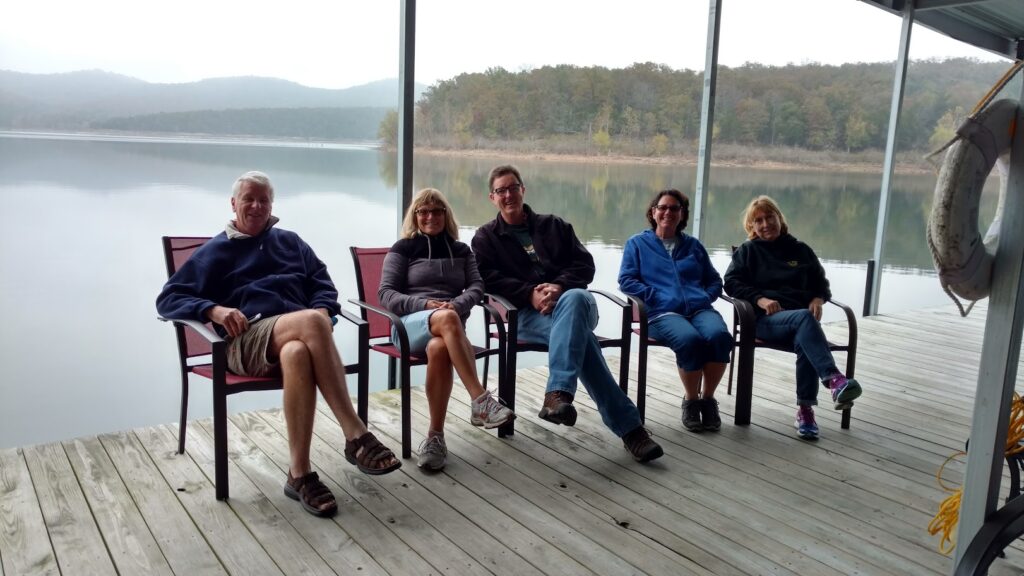Fall 2016. How much fun was that trip? We started in Chicago for the famous Ireland win over New Zealand! With a stop in St Louis to visit Anita before we proceeded to Mike and Rita’s place at Shell Knob and then to Lincoln to continue the fun.
I want to start out this post by saying unequivocally that I absolutely do not know all the questions to ask. Does anyone?
The very first day we were in Dr. Lydiatt’s office at the Med Center in the fall of 2013 we were both so overwhelmed! It was unbelievable. In the course of a half an hour Jim went from having one doctor, and he had just been recruited from among Jim’s large sphere of friends, (remember we had just moved back to Nebraska!) to having an Oncologist, a radiation specialist, a chemotherapy specialist, a new dentist, a speech pathologist and a team of nurses from the study he had just signed up for.
I was scribbling notes and asking for names to be spelled. Dr Lydiatt stopped several times for me to catch up. I immediately liked him. Our minds were swimming. I know that they repeated things; instructions, recommendations, more than once. Plus I was given a large packet of information about his cancer to take home.
His treatment would require 35 radiation treatments directed at the back of his tongue. The radiation required such precision that a mask would be made of his head out of a woven plastic material. That mask would be used to keep his head from moving even a smidge during radiation. His head would be screwed to the radiation table in that mask 35 times.
There were also to be three chemotherapy treatments to give that radiation some punch.
Everything in his throat and neck and salivary glands would be affected, including his hearing. He could lose his sense of taste. And his skin would be burned to a frizzle.
They warned us that he would probably not be able to swallow and that at some point in time during the treatments he might require a feeding tube. Would he like to get one now? When you have been a strong, very healthy person your whole life as Jim had been, these possibilities just don’t seem real. They were very real.
He had been warned and he had scoffed. He actually said let’s see how it goes. It didn’t go well. By the time he had asked for a feeding tube, and we waited for the appointment to be set up, and it was set up, and he got it, and we waited for it to heal enough for him to use, he had lost thirty pounds. He told me he thought he was starving to death. He lost over forty pounds in all during that treatment.
What question should we have asked? What is the percentage of people undergoing this treatment who need to use a feeding tube at some point in time? Oddly enough, in the years before and after Jim’s “inconvenience” we knew of three other men who were treated for very nearly the same cancer. All ended up with feeding tubes, one, unfortunately died. Three of the four were from the same neighborhood in Omaha.
I would think that at some point in time he must have been offered a port. A port can be so convenient. I think we thought, “Well he’s just mostly getting radiation! He doesn’t have to get poked for that!” We were so naïve.
What question should we have asked? Exactly how many times will a member of your staff have to find a vein in Jim’s arm or hand and how are his treatments going to affect your ability to do this?
I don’t think there are enough ways I can impress upon you the importance of this question. I was lucky. When I had my heart surgery they just automatically attached some sort of port type apparatus onto a vein in my neck. (Wasn’t that attractive?!) No one had to poke me ever for anything. Need blood? Attach your vial to my neck port. Off you go! And they did that three or four times a day. I was very grateful for it no matter what it looked like!
By the end of Jim’s treatment he had no veins left that they could access.
How can you possibly know which question is the one that will lead you to the right decision? For me, from now on I will go back to beginning journalism: how, when, where, what, why.
And if everybody in the room is saying you might need it – do it!
How can it hurt and how much can it help?
